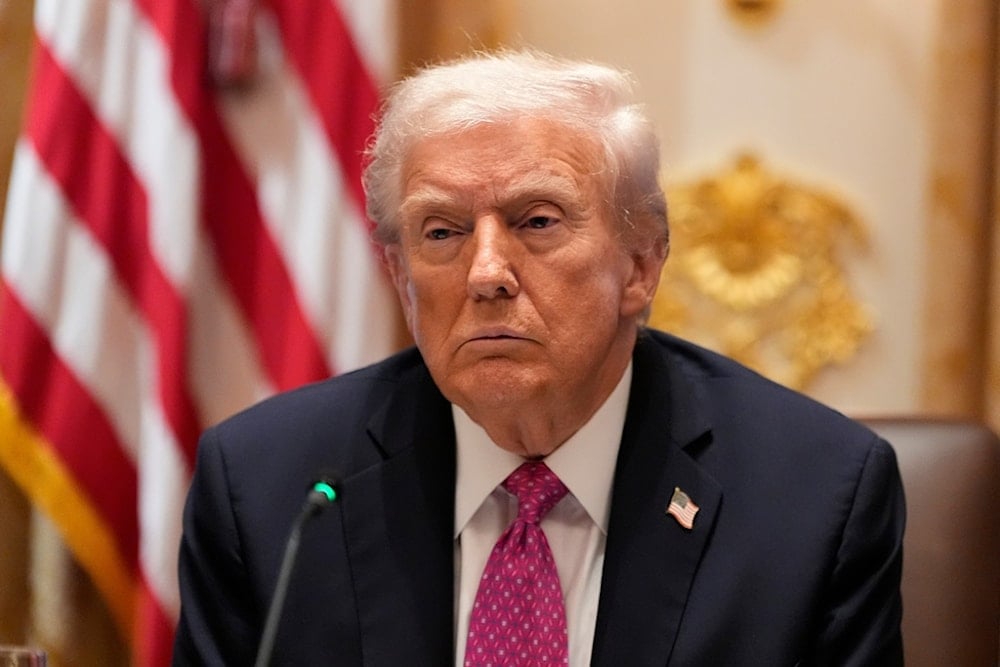Trump: No Gaza troops, no more arms to Ukraine, tariffs on China
In a televised interview, US President Donald Trump outlined a restraint-focused foreign policy, limiting arms to Ukraine, rejecting US troop deployment in Gaza, and defending new tariffs on China while preparing for talks with Vladimir Putin and Xi Jinping.
-

President Donald Trump attends a lunch with Ukraine's President Volodymyr Zelenskyy in the Cabinet Room of the White House, Friday, Oct. 17, 2025, in Washington (AP Photo/Alex Brandon)
In a wide-ranging interview aired Sunday, US President Donald Trump sketched a posture of military restraint and transactional diplomacy across three flashpoints, Ukraine, Gaza, and China, while stressing that US stockpiles and economic interests come first.
Ukraine: weapons caution, diplomacy track, and a Budapest summit
Trump reiterated that Washington will not drain its arsenals to keep Kiev supplied indefinitely. "We can’t give all of our weapons to Ukraine. We just can’t do that. I have been very good to President [Volodymyr] Zelensky and to Ukraine but… I can’t jeopardize the US," he said. He added that Tomahawk cruise missiles must be retained for US defense and said he had discussed the issue directly with Russian President Vladimir Putin. Despite the war, he pointed to "great potential for trade with Kiev" and said he hopes Moscow and Kiev "reach an understanding to end hostilities."
Those comments land as Washington and Moscow prepare a meeting in Budapest in the coming weeks, following a recent Trump-Putin call. The Kremlin has signaled openness to talks, while Zelensky has voiced skepticism about Russian intentions. The Tomahawk pause also gives Washington leverage over both sides as negotiating terms are scoped.
Gaza: no US troops amid mounting ceasefire breaches
On Gaza, Trump confirmed that the United States will not deploy forces to the enclave to target Hamas. "We won’t have boots on the ground. There is no reason to," he said. He indicated any disarmament push should be carried by "Israel" or a regional proxy with US support at a distance.
His stance comes as Gaza authorities accuse Israeli forces of repeatedly breaching the ceasefire announced last week. Officials have documented 47 violations since Monday, reporting 38 killed and 143 wounded, after earlier tallies cited 36 breaches within the first five days. Strikes were reported in Gaza City, Jabalia al-Balad, and Khan Younis. The Rafah Crossing remains closed, and the Palestinian Authority has indicated readiness to assume its administration. Local bodies warn of an acute recovery crisis, estimating up to 70 million tons of rubble, roughly 20,000 unexploded munitions, and extensive urban damage, including claims that most of Khan Younis is in ruins, with cumulative war casualties since October 2023 exceeding 67,000 killed and 170,000 wounded.
Trump has separately said that if Hamas fails to uphold ceasefire obligations, "Israel will be back on those streets at my word," framing US policy as conditional support tied to on-the-ground compliance.
Read more: 'Israel' may resume Gaza war if Hamas breaches ceasefire, Trump says
China: 100% tariff pressure with room for a deal
Turning to Beijing, Trump defended the new round of import tariffs while acknowledging their cost. "It’s not sustainable, but that’s what the number is… They forced me to do that," he said, accusing China of long-running unfair practices but insisting on the need for a "fair trade deal."
He said he will meet Chinese President Xi Jinping in South Korea "in a couple of weeks," noting a separate session is also planned. The tariff escalation follows frictions over Chinese export controls on critical inputs and dueling maritime fee regimes, even as both sides signal they are open to negotiations.
Read more: US, China to resume trade talks in Malaysia to avert tariff war

 4 Min Read
4 Min Read








